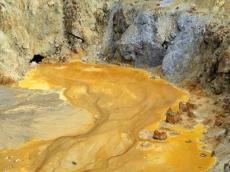|
|
TODAY.AZ / Society
Minister: Restoration of biodiversity underway in Karabakh
29 July 2022 [14:29] - TODAY.AZ

By Azernews
By Sabina Mammadli
Azerbaijan continues taking measures in order to rehabilitate the biodiversity of Azerbaijan's Karabakh and East Zangezur economic regions, Minister of Ecology and Natural Resources Mukhtar Babayev said.
He made the remarks in an interview with the EUobserver, a Brussels-based online newspaper.
“First, the territory has to be cleared of land mines, which is painstaking and time-consuming work. But last month we were able to release tiny Brook Trout (Salmo trutta fario) into the Basitchay and Hakari rivers in Zangilan. We also planted chinar saplings in Basitchay State Nature Reserve in an attempt to replace the rare Oriental Plane trees that felled during the occupation. These are small steps but symbolize our resolve to restore the biodiversity of this stunning region,” the minister noted.
Further, Babayev stated that the country is rebuilding its settlements as "smart" cities and villages and creating a green energy zone within the framework of "Azerbaijan 2030: National Priorities for Socio-economic Development".
“Electricity will be generated by solar, wind, and small hydropower plants. Our target is to create a net zero emission zone in the liberated territories by 2050,” he shared.
Additionally, the minister brought attention to the water pollution in the liberated territories committed during the Armenian occupation.
Specifically, talking about the Okhchu River, Babayev emphasized that it is polluted with heavy metals and hazardous substances from copper and molybdenum mines in Armenia, operated by international companies.
“I've called on the international community to help stop this pollution, but with no result as yet. When our displaced people finally return to their homes, it's crucial that they live in a safe environment,” he stressed.
According to the minister, today Azerbaijan is facing water shortages and water pollution, due to the fact that almost 70 percent of freshwater resources are formed outside the country.
“A more effective exchange of information and coordinated actions with the neighbors would strengthen your resilience to some of the impacts of climate change. No country can cope with these challenges alone,” he added.
URL: http://www.today.az/news/society/223548.html
 Print version
Print version
Connect with us. Get latest news and updates.
See Also
- 16 January 2026 [11:51]
Over 6 kg of narcotics seized in Tovuz, two detained - 15 January 2026 [14:54]
Turkiye backs Zangazur Corridor according to Azerbaijan’s plans, says FM Hakan Fidan - 15 January 2026 [14:46]
Azerbaijan, Vietnam explore joint opportunities in electric vehicle production - 15 January 2026 [14:13]
Azerbaijan establishes Western Industrial Park - decree - 15 January 2026 [12:14]
Baku conference to spotlight racism and violence against Sikhs in India - 15 January 2026 [12:08]
Pakistan launches ASAN Service Center in Islamabad with Azerbaijan’s support - 15 January 2026 [11:50]
US visa restrictions expand to 75 countries, affecting Azerbaijan and South Caucasus states - 14 January 2026 [15:19]
Azerbaijan participates in 298th IPU Executive Committee Session in Doha - 14 January 2026 [11:24]
Interviews begin for WUF13 Volunteer Program in Baku - 14 January 2026 [11:02]
Armenia publishes framework for TRIPP transit route
Most Popular
 Azerbaijan launches industrial copper mining: Demirli opens up new opportunities
Azerbaijan launches industrial copper mining: Demirli opens up new opportunities
 Armenia is reforming the army: revanchists are worried
Armenia is reforming the army: revanchists are worried
 Armenia publishes framework for TRIPP transit route
Armenia publishes framework for TRIPP transit route
 Armenia takes control of its borders as old dependencies from Russia unravel [INTERVIEW]
Armenia takes control of its borders as old dependencies from Russia unravel [INTERVIEW]
 Azerbaijan launches desalination of Caspian water - innovations and international experience
Azerbaijan launches desalination of Caspian water - innovations and international experience
 TotalEnergies and Bapco Energies launch BxT Trading joint venture in Bahrain
TotalEnergies and Bapco Energies launch BxT Trading joint venture in Bahrain
 Tehran warns of strikes on US bases across region
Tehran warns of strikes on US bases across region
